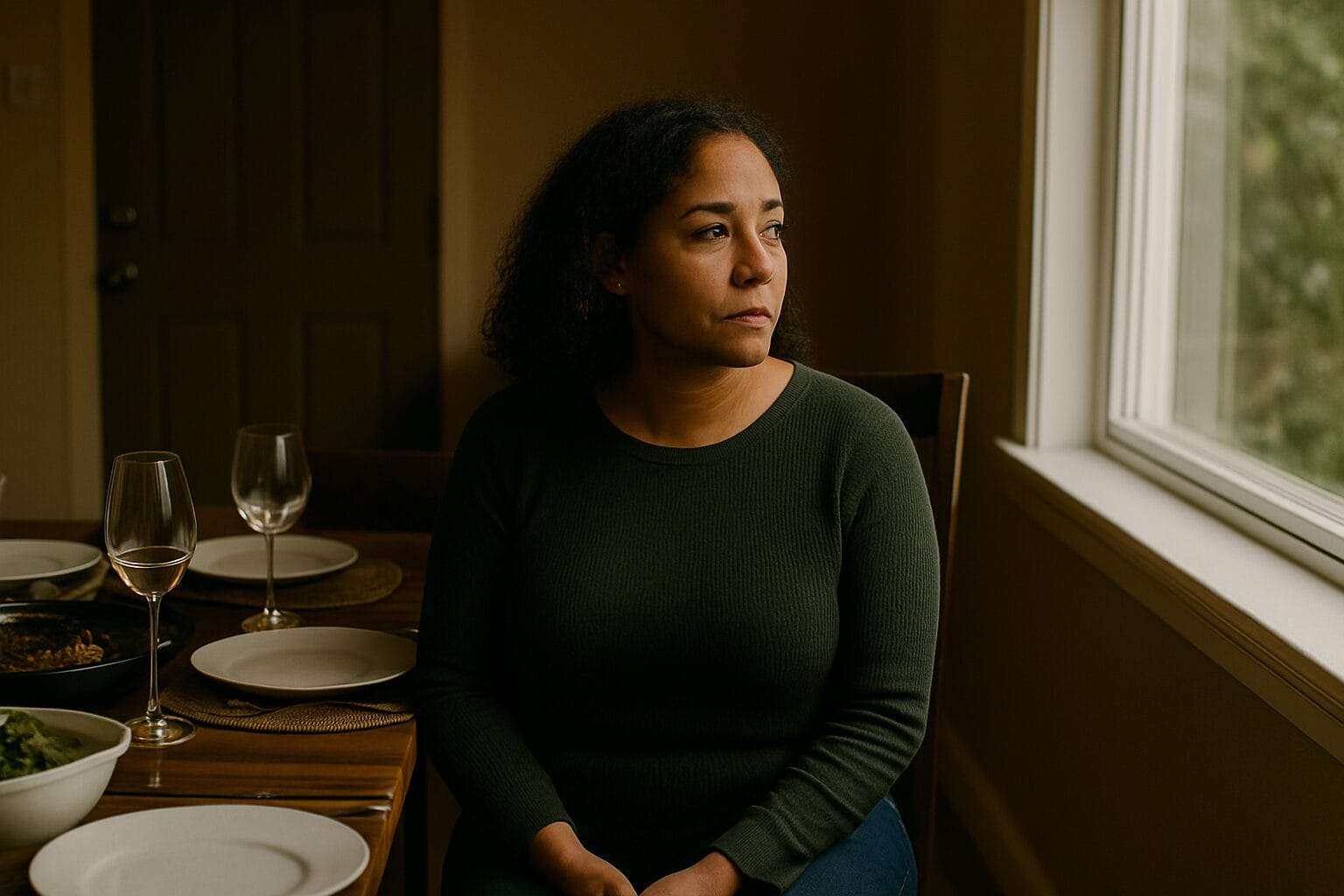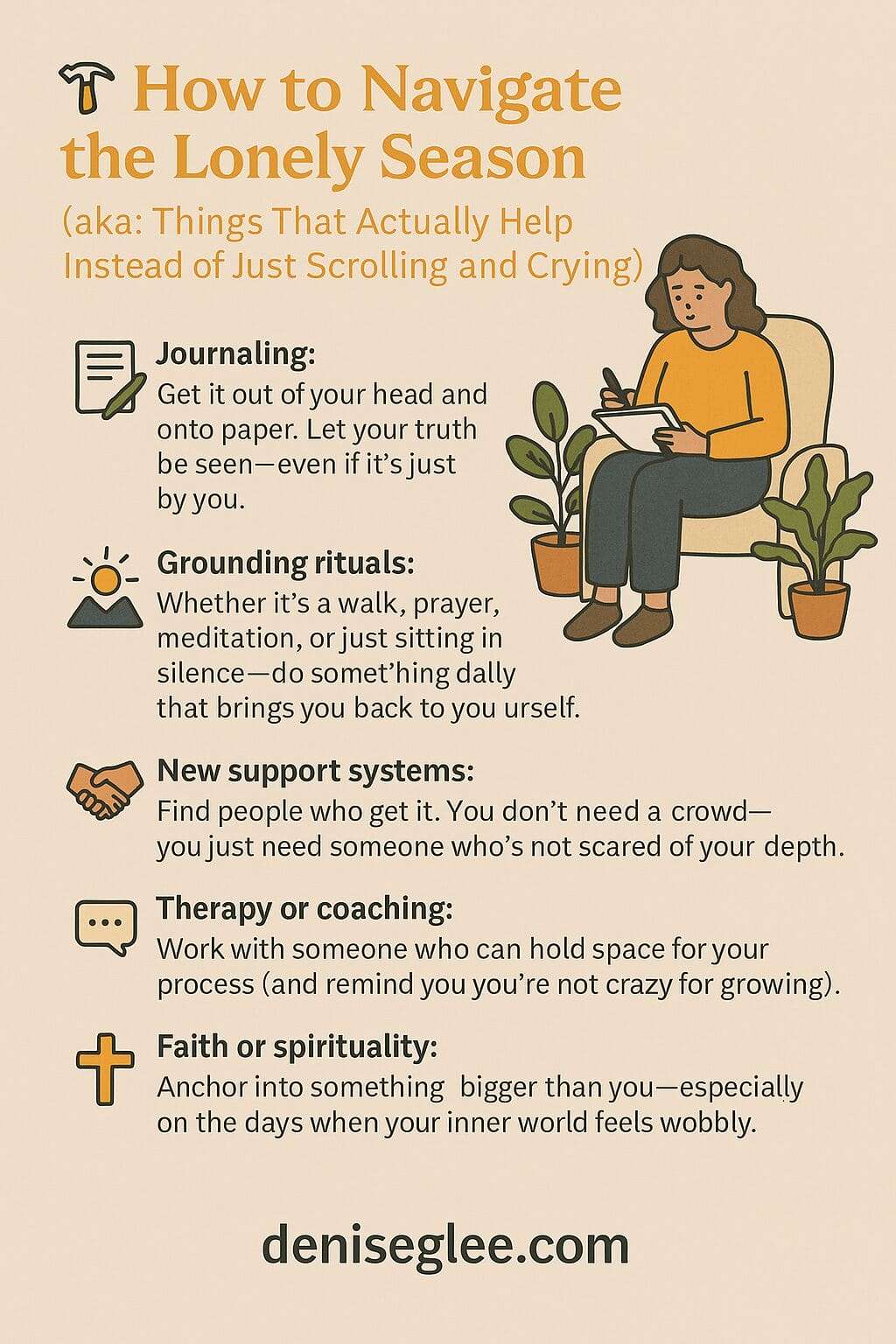- Updated: October 23, 2025
Even when people admire you—at work, at home, in your community—growth doesn’t always land like applause.
You can be respected, even envied, and still feel the sting when you start changing. Because self-improvement doesn’t just shift you—it disrupts the roles and relationships that once felt solid.
If you’ve ever felt like the more you grow, the lonelier it gets—this is for you.
You start setting better boundaries.
You speak more honestly.
You outgrow people, habits, and spaces that once felt like home.
And then? The loneliness creeps in.
Growth is powerful—but it’s also messy. It comes with grief, because becoming more whole often means walking away from what no longer fits.
Let’s talk about why.
The Leader’s Guide to Emotional Growth
💡 What Emotional Growth Really Means
Let’s keep it honest:
Emotional growth isn’t just about feeling better. It’s about becoming someone different—someone who leads, loves, and makes decisions from a deeper place of self-awareness.

For a leader, this shift can feel both powerful and isolating. Because while you’re learning to respond with clarity and courage, others might still be stuck in blame, avoidance, or emotional immaturity. And their discomfort with your change? That’s not your cue to shrink. It’s your call to rise.
Emotional growth means:
Awareness: Seeing your emotions clearly and understanding how they shape your choices.
Resilience: Recovering faster, without spiraling into shame or overthinking.
Boundaries: Stopping the apology loop when you say “no” to what drains you.
Vulnerability: Choosing honesty over performance—even when it’s uncomfortable.
Because true leadership isn’t about being untouchable—it’s about staying present, even when others can’t meet you there.
🌀 The Phases of Emotional Growth
(aka: “Why does this feel like a whole identity crisis?”)
Awakening:
You realize, “Something has to change.”
You can’t keep doing things the old way.Discomfort:
You feel all the things.
It’s messy. You’re tender. Nothing feels stable.Shedding:
You start letting go—habits, roles, even people—that no longer fit the real you.Realignment:
You rebuild.
This time, with more clarity and peace. You know who you are—and you’re not performing anymore.

This isn’t about becoming perfect.
It’s about becoming honest.
Grounded.
Available to yourself and others in a way you weren’t before.
And yeah—it can feel lonely.
But you’re not alone in it.
🧠 Why Emotional Growth Feels So Lonely
(It’s not just you—and it’s not bad luck.)
The loneliness that comes with emotional growth isn’t random.
It’s not because you’re broken, too intense, or “too much.”
When you start changing but the people around you stay the same—or stay stuck—everything shifts. And the more you lead yourself with clarity and boundaries, the more obvious it becomes who thrives on your old patterns.
Let’s break down why this happens:

🔗 Attachment Styles: How You Learned to Relate
When you start healing, your attachment system gets shaken up. Early relationships taught you how safe it was to ask for help, how much closeness you could tolerate, and what you had to do to feel “enough.”
Most people unconsciously fall into one of four patterns:
Secure: Comfortable with closeness and independence.
Anxious: Craves connection but fears being abandoned.
Avoidant: Distrusts intimacy, stays emotionally distant.
Disorganized: Wants connection but fears it—often linked to trauma.
If you grew up without consistent emotional safety, you probably learned to overfunction, shut down, or people-please to survive. Now, when you speak up or stop rescuing everyone at work or home, your nervous system reads it as danger—even if it’s growth.
🧠 From Childhood Reflex to Adult Pattern
Healing exposes the reflexes you built to stay safe:
Saying “yes” when you meant “no.”
Chasing people who were never emotionally available.
Shrinking your needs to keep the peace.
When you stop doing these things, others may pull back because they preferred the version of you who overgave and never challenged them. It’s not just awkward—it can feel like rejection. But it’s not. It’s recalibration.
💥 Why Growth Isn’t Just Empowering—It’s Disruptive
Emotional growth doesn’t just make you stronger. It rewrites the script. You stop playing the part that made everyone else comfortable—and relationships either deepen or dissolve.
You’re not losing people. You’re losing outdated survival strategies.
And that, my friend, is sacred work.
🎭 Family Roles: When You Stop Playing the Part They Cast You In
Most of us didn’t grow up in emotionally healthy environments—we grew up in systems. Families with unspoken rules, silent power plays, and survival roles that trained us to perform instead of truly connect.

These aren’t choices—they’re scripts handed to you. Usually based on birth order, temperament, or who the adults needed you to be in order to keep control.
When you start healing?
When you stop caretaking, overachieving, or performing ease?
You stop playing the part.
And people notice.
You might hear:
“You’ve changed.”
“Why are you so distant?”
“You used to be so easygoing.”
What they’re really saying: “I don’t know how to relate to you now that you’re no longer performing for my comfort.”
Healing is like rewriting a script you didn’t know you were performing. Not everyone will stay for the next act—but the ones who do? They’ll meet the real you.
This isn’t just uncomfortable for them—it’s disorienting for you too. Because for a long time, being the “hero” or the “fixer” kept you safe.
But healing demands you stop performing safety. It asks you to be real—even if it disappoints others.
If you’ve ever wondered why you feel like a “fake introvert” or “fake extrovert,” this is why. Read more about breaking that performance loop here.
It’s not rejection—it’s rebirth.
You’re not abandoning your family. You’re releasing roles that were never truly yours.
💔 The Emotional Cost—and Why It’s Worth It
Let’s not sugarcoat this: growth hurts.
Letting go of old patterns—or people—comes with a real cost. You might feel sad, heavy, or full of doubt. You might grieve what was… even if it wasn’t healthy.
But that grief?
It’s not a sign you’re doing it wrong.
It’s proof something sacred is shifting.

Just like I wrote in When Clarity Costs You Community, clarity doesn’t just reveal truth—it reveals who was only connected to you as long as you stayed convenient. Growth doesn’t push aligned people away; it filters out the ones who required your self-abandonment to stay connected.
You’re allowed to miss what you’ve outgrown. You’re allowed to feel tender, lost, or even angry. That doesn’t mean you’re sliding backward—it means you’re healing in real time.
Here’s the part most people skip:
Peace doesn’t arrive at the start. It comes after the loneliness. After the confusion. After you’ve let go of enough noise to finally hear your own voice again.
And when that clarity arrives—when you feel that quiet sense of “I know who I am now”—it’s priceless. Especially if you’re leading others.
Because leaders who’ve walked through their own transformation stop leading from ego. They set boundaries without guilt. They become empathetic without overgiving. They connect with people—not to control them, but to truly see them.
That kind of leadership is magnetic. It’s real.
And yes, the emotional cost is real. But what’s waiting on the other side—peace, integrity, connection that doesn’t require pretending—is always worth it.
🌱 Signs You’re Growing—And How to Survive the Lonely Season
Here’s the truth most people don’t tell you:
Emotional growth doesn’t feel like a glow-up at first.
It feels like confusion, disconnection, and random crying in your car. It feels like suddenly being hyper-aware of everything you once ignored—people’s energy, unspoken dynamics, the drama you used to tolerate without blinking.

But just because it feels messy doesn’t mean you’re not making progress.
Here are a few signs you’re growing—even if it doesn’t feel that way yet:
You’re extra sensitive to people’s energy—because you’re no longer numbing.
Friends or family say, “You’ve changed” (and they don’t mean it as a compliment).
You crave more alone time to think, feel, and process.
You grieve past versions of yourself—even ones you thought you wanted to keep.
You’ve stopped tolerating the dysfunction that used to feel normal.
If any of this sounds familiar, you’re not regressing. You’re waking up. And yes—it’s disorienting. But it means you’re becoming more honest, more grounded, more you.
🌾 How to Navigate the Lonely Season
This in-between season can feel heavy. But there are simple, real tools to help you stay rooted while everything shifts:
Journaling: Get it out of your head and onto paper. Let your truth be seen—even if only by you.
Grounding rituals: Whether it’s a walk, prayer, or meditation, find something that brings you back to yourself daily.
New support systems: You don’t need a crowd—you just need one person who isn’t scared of your depth.
Therapy or coaching: Work with someone who can hold space for your growth (and remind you you’re not crazy for changing).
Faith or spirituality: Anchor into something bigger—especially on the days your inner world feels wobbly.
And when the urge comes to go backward—reach out to someone toxic, overgive, or shrink so you’ll be liked again?
Pause. Breathe. Remember why you started.
Old comfort won’t create new peace.
You’re not meant to go back—you’re meant to go forward.

📌 Your Next Chapter Starts Here
Emotional growth can feel lonely—quiet, disorienting, even heavy.
But that doesn’t mean you’re doing it wrong.
It means you’re becoming more honest with yourself. More grounded. More you.
As I remind my clients:
Lonely isn’t forever—it’s just the quiet space where the real you emerges.
You’re shedding roles, rewriting patterns, and learning to show up without the mask.
That’s not weakness. That’s strength.
And it’s the kind of strength that builds a life rooted in clarity, connection, and truth.
If this resonated with you, here are a few ways we can stay connected:
- 🎧 Listen to the podcast – real-talk episodes on healing, leadership, and emotional sobriety (especially for business owners and change-makers)
- 💌 Write me a note – if this article stirred something in you and you want to share, I’d love to hear it
- 🤝 Explore working together – if you’re ready for deeper emotional clarity and support in your leadership or healing journey
You don’t have to rush this season.
You don’t have to pretend it’s easy.
And you definitely don’t have to do it alone.
You’re doing sacred work.
Let that be enough—for now. 💛



